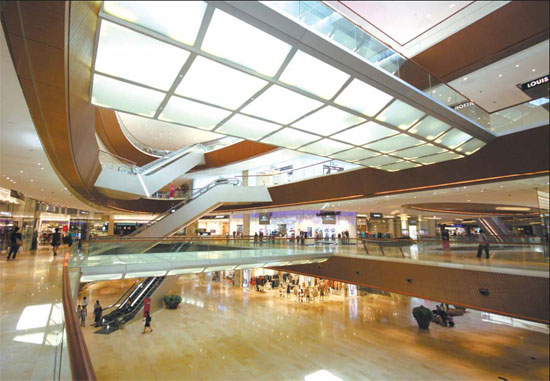Swire learns lessons as it builds a business
Updated: 2013-02-28 08:01
By Qiu Quanlin in Guangzhou (China Daily)
|
|||||||||||
|
TaiKoo Hui is a hub for luxury brands in Guangzhou. The retail occupancy rate of its mixed-use commercial properties is now almost 99 percent and that for its offices is close to 80 percent. Chen Xiaotie / For China Daily |
Developer looks to residential sector and second-tier cities to promote further growth
When Swire Properties, a Hong Kong-based developer of mixed-use commercial properties, established its office in Guangzhou in 2001, it also began construction of its first commercial project on the mainland.
However, it took almost 10 years for the company to finish TaiKoo Hui, a flagship property for the company on the mainland. It covers a total gross floor of 358,000 square meters and consists of retail and office elements, a hotel and a cultural center.
"It took too long for us to finish the project. We made some mistakes during that period," said Guy Bradley, CEO of Swire Properties Chinese Mainland.
Bradley called TaiKoo Hui "a learning project" for Swire Properties, saying: "I think every company has a learning project after it comes to China."
Early media reports said the company encountered problems in negotiations with the local government on building a subway station at TaiKoo Hui.
"Something must have been wrong with the Guangzhou project because both people from the partners and our teams and government officials involved in the project changed positions over the last decade. We didn't know how to be more effective locally at that time," Bradley said.
Swire Properties has a 97 percent stake in TaiKoo Hui, which is located in the Tianhe central business district of Guangzhou, the capital of Guangdong province.
"The only good news is that we bought the land for a very low price 10 years ago. We need to make sure we will not repeat the same mistakes in our future projects," he said.
Learning from the project, Swire Properties has changed its business model, now teaming up with local developers. "The operation enables us to use the expertise of both sides to complete projects more quickly and more efficiently," he said.
The company's two new projects - Beijing Indigo and Chengdu Daci Temple - are joint ventures with domestic developers Sino-Ocean Land. And another Shanghai project is a joint venture with HKR International.
"The latest project Indigo, which just opened in Beijing last year, took less than four years to complete. The Chengdu project will be finished this year. We bought the land at the end of 2010," Bradley said.
Career in Swire
Bradley has been working in the Swire group for more than 24 years at management positions in various divisions in different nations and regions, including Papua New Guinea, Japan, Hong Kong, the United States, Taiwan, Vietnam and the Middle East.
After moving across to Swire Properties in 2006, he assumed his current role in 2011.
Recalling his first 10 years in the conglomerate - working for Swire Coca-Cola Beverage, Bradley said: "That's the footprint for Swire Coca-Cola. I ran the franchise in Fujian province. The beverage business gave me a very good experience in how to live and work in China."
The beverage business also gave Bradley an impression of what he called "the real China".
"It is quite useful because we were on the streets dealing with small shops and checking transportation work and warehouse operations. It's the real China. I also went to Jiangsu for three months during that period, visiting every corner of the province," he said.
Bradley said he is now in the most exciting business of his career because China offers huge business opportunities for Swire Properties. "There is no place I would rather be at this moment. This is where I want to be working. This is a story for business," he said.
Chinese commercial and mixed-use properties are lucrative to investors. In 2010, en bloc real estate investment reached a record $15.02 billion, up 34.6 percent compared with the year before, a Jones Lang LaSalle report said. This is in sharp contrast with the weakened property market in the United States and Europe, which are still suffering from the fallout of the global financial crisis.
"The interest in commercial properties was also triggered by the central government's tough restrictions on residential property trading, which diverted capital into the commercial sector, especially in first-tier cities," said Qin Hong, director of the policy research center affiliated with the Ministry of Housing and Urban-Rural Development.
Today's Top News
Police continue manhunt for 2nd bombing suspect
H7N9 flu transmission studied
8% growth predicted for Q2
Nuke reactor gets foreign contract
First couple on Time's list of most influential
'Green' awareness levels drop in Beijing
Palace Museum spruces up
Trading channels 'need to broaden'
Hot Topics
Lunar probe , China growth forecasts, Emission rules get tougher, China seen through 'colored lens', International board,
Editor's Picks

|

|

|

|

|

|






